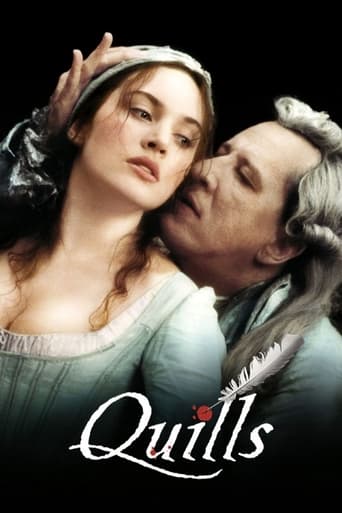Kirpianuscus
the story of Marquis de Sade is known. as ball of myths and suppositions and rumors. as result of lecture, in the late childhood, of his writings. the film do not propose a portrait of him. but the web who defines and support his eccentricity. Quills remains always a surprise for the viewer. for its status of mechanism of a clock. because the performances of each actor becomes part of fascinating game of a delicate work of clock. each scene becomes key for discover the truth behind appearances. the idealism against the right public image. the love and the manipulation. the fear and its use for build the cage. the mistakes. the duel between Marquis and Royer-Collard represents the axis of a story about values and risks to assume the words. and, as each great film, Quills has the precious gift to say a story of today. as a parable, maybe. as demonstration, surely. this is the detail who does it not a good film but almost an experience.
Cheese Hoven
My main problem with this is that it bears absolutely no relation to the truth of De Sade's stay at Charenton. A full list of these can be found at Quills' wikipedia page, but the most horrendous are the torture and tongue removal of De Sade, neither of which took place. The real De Sade died peacefully in his sleep in his 70s and had been freely allowed to write (he also did not write anything sexual while at Charenton).The question is, why is the truth so much distorted? Is it to make the (rather weak) point that De Sade was a champion of free speech while his opponents were pious hypocrites? Such a point is really not worth making especially since De Sade was originally committed not for his writings but he actual crimes, such as rape and attempted murder.Whatever the intention, Quills amounts to a historical slander against Abbe du Coulmier (here depicted as a sexually repressed if well meaning liberal) but more especially Dr Royer-Collard, shown as a rapist, paedophile and torturer! There are some interesting ideas along the way. The Marquis' reductionist view of humanity "we eat, we sh*t, we f*ck" is challenged by the Abbe "but we also fall in love and write symphonies" but this is sadly not taken any further. Other ideas, such as to what degree pornography can provoke rape, as it does near the end, are also under developed.Instead we have plenty of time for wallowing in a soft porn version of the 18th century. Literally all the 'lower orders' are aroused by De Sade's writings, even those old enough to know better, such as the ageing blind mother of the maid. They cavort about in their underwear playing with themselves while the stories are read out or engage in free love. Implausibly Royer-Collard's virginal wife, fresh from a nunnery, has acquired a copy which she avidly reads. And amazingly, the ringleader in this vice, the maid (played by Kate Winslet) is revealed to be a virgin in the end! Mirable Dictu! By contrast all the authority figures are shown as being hypocritically outraged by De Sade's work. Now, an interesting discussion could be had about the merits of pornography both as satire and as a freedom of expression, but they are not had here. Nor is the idea of sex as forbidden fruit really explored other than in this cartoonish way. The real impact of De Sade's ideas are only hinted at near the end, when the aforementioned attempted rape occurs but this is quickly undermined by the dishonest amputation of De Sade's tongue which gives the impression that society is merely trying to silence the messenger.The performances are variable. Geoffry Rush gives his usual commanding performance, while Phoenix effects his English accents. Winslet is so-so in a role which is unconvincingly written
dragokin
Quills was not the only film about Marquis de Sade in 2000. It was more of a theatrical experiment, though, whereas French movie Sade offered an almost philosophical discourse.The premise here was that Marquis de Sade had been a whimsical old man. Not sure why this was the case, since the historical figure was a mere pervert with homicidal tendencies.The premise, in turn, follows a trend in contemporary art and culture, where Marquis de Sade becomes almost a free speech activist in today's terms.We might argue whether the film should follow historical facts or author's vision, but for me Quills deserves two stars.
MBunge
This film is a valiant effort to tell a story about a profoundly contemptible human being. It features a fine performance from Geoffrey Rush and boatloads of provocative, controversial moments, but the movie founders on its failed efforts to makes excuses for the horrible nature of its main character.Set in an asylum during Napoleonic France, Quills tells the last bit of the life story of the Marquis De Sade (Geoffrey Rush), the legendarily perverse and deviant writer. He's been locked up in the asylum to try and contain his monstrous imagination, yet he continues to smuggle out new works of blasphemy and pornography with the help of a chamber maid named Madeleine (Kate Winslet). The head of the asylum, a priest named Coulmier (Joanquin Phoenix), is blissfully unaware of De Sade's continued writing until Napoleon himself sends the harsh and unbending Dr. Royer-Collard (Michael Caine) to put a stop to De Sade's activities. Royer-Collard presses hard on Coulmier to muzzle De Sade, which results in an increasingly desperate battle of wills between the holy man and the infamous smut-wallower.There are a lot of good things about Quills. It has a lot of sharply written dialog and compelling scenes performed by a talented cast. Geoffrey Rush is quite bold and charismatic as De Sade, but that is the character that the script crashes into and never quite gets around. The Marquis De Sade was, by pretty much any standard, a vile and contemptible human being. He's really not the equivalent of a modern-day pornographer because, not only did his writing dwell on grotesque violence as much as sexual depravity, but De Sade himself engaged in acts that would be considered awful crimes both in his day and ours.De Sade was something like a cultural terrorist and that's not much of an overstatement. If you're going to portray De Sade as some sort of anti-hero or a tragic figure, you need to provide some greater justification for his abominable behavior. His degeneracy needs to be in pursuit of a higher value like truth or freedom. As Quills presents him, De Sade is pretty much a degenerate for the sake of degeneracy. That makes it hard to feel any empathy for him and his situation, no matter how difficult and extreme that situation becomes. The story does suggest his obsession with perversion was a reaction to what De Sade saw during the Terror of the French Revolution. That's an excuse, though, not a justification.Seemingly to compensate for its inability to grapple with its main character, Quills offers up not one but two subplots. One is about the forbidden attraction between priest Coulmier and Madeleine, which does fold back into the struggle between Coulmier and De Sade. The other is about Royer-Collard and his young bride Simone (Amelia Wainer), which is fairly superfluous to the story. It could be completely removed from the film and nothing of importance would be lost. Neither subplot stands on its own and it feels like they were woven into the script because writer Doug Wright didn't know what else he could do with his main character.There's a moderate amount of profanity, nudity and other things of a prurient nature in this film, though not to the excessive amounts that would do justice to the Marquis De Sade. This movie is also, in almost all respects, a well-executed bit of filmmaking. If you go into it thinking already believing there's something worthwhile about De Sade and his lifestyle, you'll probably enjoy Quills. If you're mostly ignorant or have a negative view of the Marquis, you won't find anything here that will enlighten or change your mind.




